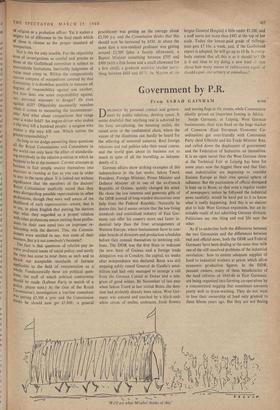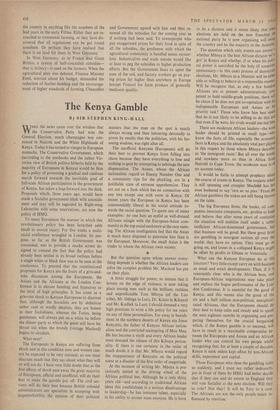Government by P.R.
From SARAH GAINHAM
BONN
DIPLOMACY by personal contact and govern- ment by public relations, develop apace. It seems doubtful that anything real is achieved by the busy aeroplaning, the beaming smiles, the raised arms or the confidential chats, where the voices of the illustrious can hardly be heard for the whirring of newsreel cameras. Real foreign relations and real politics take their usual course, and the world goes about its business not so much in spite of all the travelling as indepen- dently of it.
German affairs show striking examples of this independence in the last weeks. Sekou Tour& President, Foreign Minister, Prime Minister and Defence Minister all in one of the ex-French Republic of Guinea, quietly changed his mind. He chose the low interests and generous gifts of the DDR instead of long-winded discussions over help from the Federal Republic. Naturally he denies this, but it seems certain that the low living standards and centralised industry of East Ger- many can offer his country more and faster in- dustrial help than the freer arrangements of Western Europe, where businessmen have to con- sider boards of directors and production schedules before they commit themselves to investing mil- lions. The DDR was the first State to welcome the new State of Guinea and a foreign trade delegation was in Conakry, the capital, six weeks after independence was declared. Bonn was still stepping softly round General de Gaulle's sensi- bilities and had only managed to arrange a call from the German Consul at Dakar and a tele- gram of good wishes. By November of last year when Sekou Toure at last visited Bonn, the deci- sion had probably already been taken. West Ger- many was amused and touched by a black-and- white circus of smiles, embraces, fresh flowers and waving flags in the streets, while Communism silently gained an important footing in Africa.
Inside Germany, at Leipzig, West German businessmen, their eyes fixed on the huge market of Comecon (East European Economic Co- ordination) got over-friendly with Communist Party chief Ulbricht and his Trade Minister Rau, and called down the displeasure of government and the Federation of Industries on themselves. It is an open secret that the West German show at the Technical Fair at Leipzig has been for some years now the biggest there and that Ger- man industrialists are beginning to consider Eastern Europe as their own special sphere of influence. But the pantomime of official disregard is kept up in Bonn, so that even a regular reader of newspapers, unless he followed the industrial news carefully, would be hard put to it to know what is really happening. And this is no sinister plot to hide West German expansion, but an in- evitable result of not admitting German division. Politicians say one thing and real life says the other.
As if to underline both the differences between the two Germanies and the differences between real and official news, both the DDR and Federal Germany have been dealing at the same time with one of the still unsolved problems of the industrial revolution: how to ensure adequate supplies of food to industrial workers at prices which allow economic production figures. In the DDR, peasant owners, many of them beneficiaries of the land reforms of 1945-46 in East Germany, are being organised into farming co-operatives by a concentrated nagging that sometimes amounts pretty well to brain-washing. They do not want to lose their ownership of land only granted to them fifteen years ago. But they are not fleeing 'We'll see what Mirabel thinks of this.' the country in anything like the numbers of the bad years in the early Fifties. Either they are re- conciled to communal farming, or they have dis- covered that all regulations can be got round somehow. Or perhaps they have realised that there is no land for them in West Germany.
In West Germany, as in France and Great Britain, a system of half-concealed subsidies— that is, bribery—is used on the farmers. When the agricultural plan was debated, Finance Minister Etzel, worried about his budget, demanded the reduction of feather-bedding and the encourage- ment of higher standards of farming. Chancellor and Government agreed with him and then re- newed all the subsidies for the coming year as if nothing had been said. To townspeople who pay exaggerated prices for their food in spite of all the subsidies, the gentleness with which the agricultural community is handled seems myster- ious. Industrialists and trade unions would like at least to peg the subsidies to higher production efforts. But the Government fears to upset the sons of the soil, and factory workers go on pay- ing prices far higher than anywhere in Europe (except France) for farm produce of generally mediocre quality.



















































 Previous page
Previous page